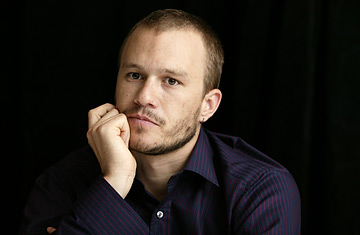
Heath Ledger
Even with his big face and chiseled jaw, Heath Ledger was one of those guys who blended in easily. In November 2005, waiting for me outside a pub, as he would have called it, he looked like any other scruffy Brooklyn local. He was then a little bleary-eyed from being a new father, but also a little wary of the press from being a heartthrob. We were meeting to discuss what would be his Oscar-nominated performance in Brokeback Mountain. We went to a local cafe. He didn't eat.
He was what we call in Australia a bloke, a guy who could rough it and wasn’t given much to talking. But his masculinity framed an urgent sensitivity: He had his mom's, sister's and two half-sisters' first initials tattooed in Gothic letters on his wrist. He gave off the air of being willing to punch someone, but only if it would mask his own pain. Because of this combination of machismo and sensitivity, like a more handsome Russell Crowe, he was in demand. He just wasn’t sure that he wanted to be. "Heath," a studio boss once told me, "needs to decide who he really wants to be."
He won't have to, now that he has been found dead in an Manhattan apartment, at the unbearably young age of 28. (An autopsy on Wednesday proved inconclusive and a medical examiner may take at least 10 days to come up with a cause of death.) It's tempting to look for signs of a melancholy temperament in our brief meeting, an interview for a story in TIME. But mostly what he gave off was dissatisfaction.
Ledger was very serious about his work, trying to forge a path like that of Sean Penn or Jack Nicholson, trying to walk the line between what the studios wanted him to be (a romantic hero such as those he played in 10 Things I Hate About You and A Knight's Tale, his first two big hits) and the more renegade figures he was drawn to (Ennis Del Mar in Brokeback Mountain, the iconic Australia outlaw in Ned Kelly or the junkie in Candy). "I wanted to scrub it all away," he said of his early forays into stardom, "and start again, to see what my abilities are, if there are any." He was hard on himself and on his performances, but wounded by criticism from others. Of the publicity for his role in A Knight's Tale, he told me, "They put my face on a poster with 'He Will Rock You' written underneath it, which I certainly didn't think I was going to.. and what if I didn't?" He added, "That freaked me the f--- up. That's where I really felt like my destiny was in somebody else's hands, and it was all being masterminded." The role in Brokeback, a sheep rancher trying to come to terms with his homosexuality, attracted him because of its complexity — and because it contrasted with his Hollywood "image." "It was going to be a challenge," he told me, "It was going to be one of those roles ... I would have to mature as a person and mature as an actor in order to tell."
Born in 1979 in Perth, Australia, he told me that he grew up playing hockey with his dad and his sisters. And his heroes were musicians. "Kurt Cobain and Bono," he said. "I guess they were about the only heroes I really had. I wasn't raised on movies." He moved to Los Angeles at the age of 19, and fame came very quickly, including a big break in the 2000 movie The Patriot co-starring fellow Aussie Mel Gibson. Celebrity had its discontents, though he found solace with the actress Michelle Williams and their daughter Matilda. But he complained about the scrutiny and the pervasiveness of the paparazzi. "They talk to you, they taunt you, they try to get you to react... and you just gotta keep walking and it's embarrassing."
Since Brokeback, he had been having general career success but personal distress. He had separated from Williams and had moved out of their sunny yellow Brooklyn home. At the same time he was receiving accolades for his performance in the Bob Dylan biopic I'm Not There and had completed filming his role as the Joker (a character Nicholson immortalized) in the new Batman movie The Dark Knight, a potential blockbuster. At the news of Ledger's death, Mel Gibson said, "I had such great hope for him. He was just taking off, and to lose his life at such a young age is a tragic loss." Ledger leaves behind a career of great promise, a too small body of films and the sense that he never admired his work as much as others did. With reporting by Rebecca Winters Keegan/Park City, Utah
